February 28, 2017
Mitzi Bytes Events
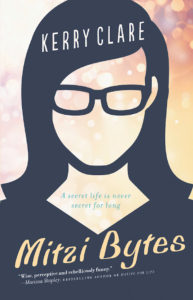 Tomorrow is March, which is the month I get to start sharing Mitzi Bytes with the world. (!!!!) I’m looking forward to the following events, and I hope you can make it to some of them.
Tomorrow is March, which is the month I get to start sharing Mitzi Bytes with the world. (!!!!) I’m looking forward to the following events, and I hope you can make it to some of them.
- March 11, Whitby ON, Writers Community of Durham Region
- March 16, Toronto Launch, Ben McNally Books
- March 18, Peterborough ON, Hunter Street Books
- March 26, Uxbridge ON, Books and Brunch with Blue Heron Books
- April 4, Toronto ON, In Her Voice Reading Series, Dora Keogh Pub
- April 5, Toronto ON, Pivot Readings Series
- April 6-9, Hamilton ON, gritLIT Festival
- April 13, Toronto ON, the eh List Author Series, Toronto Public Library
- April 26, Waterloo ON, Wordsworth Books’ Appetite for Reading Book Club
- April 27, Toronto ON, Toronto Public Library Bibliobash
- May 5-7, Gananoque ON, Thousand Islands Writers Festival
- July 14-16, Lakefield ON, Lakefield Literary Festival
February 26, 2017
Son of a Trickster, by Eden Robinson
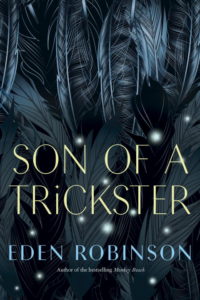 I went to see Eden Robinson at the Toronto Reference Library at the beginning of the month where she was in conversation with Miriam Toews. It was a perfect pairing, these two understated, seriously brilliant and totally hilarious writers together, and many of their sentences would trail off into hysterical laughter. The effect of all this being that when I finally picked up Son of a Trickster, its voice in my head was Toews’ cool easy cadence. This is not a complaint. Like Toews does, Robinson’s work is an uncanny breezily brutal, absurd humour juxtaposed with weighted tragedy, and there doesn’t actually appear to be anything of a juxtaposition at all.
I went to see Eden Robinson at the Toronto Reference Library at the beginning of the month where she was in conversation with Miriam Toews. It was a perfect pairing, these two understated, seriously brilliant and totally hilarious writers together, and many of their sentences would trail off into hysterical laughter. The effect of all this being that when I finally picked up Son of a Trickster, its voice in my head was Toews’ cool easy cadence. This is not a complaint. Like Toews does, Robinson’s work is an uncanny breezily brutal, absurd humour juxtaposed with weighted tragedy, and there doesn’t actually appear to be anything of a juxtaposition at all.
I loved Son of a Trickster, the first novel in ten years by Haisla/Heiltsuk Robinson. (“Her two previous novels…were written before she discovered she was gluten-intolerant and tend to be quite grim,” so goes her cheeky author bio.) At her TPL event, Robinson explained that this is a novel born of the 2008 financial meltdown, a problem that didn’t affect Canada so extensively, except for in small pockets we don’t hear about a lot, such as Robinson’s hometown of Kitimat, BC, where 535 workers lost their jobs when the pulp and paper mill closed in 2010. It’s in the aftermath of this that we find her main character Jared, sixteen-years-old and doing his best to keep things afloat. He makes money baking pot cookies and selling them to his classmates, but then he turns that money over to his father’s landlord so he won’t be made homeless as he struggles with addiction. Which Jared’s mother can know nothing about, because she’s terrifying (when she discovered a former boyfriend beating up Jared, she attacked the guy with a nail gun, fastening him to the floor) and if she finds out Jared is supporting the father who abandoned them, he might have (justifiable) reason to fear for his life.
The novel begins when Jared was small, when his parents were still together and in love, and it would be his father’s job loss at which point the whole arrangement falls apart. Although all was not always idyllic—his maternal grandmother had never liked Jared, as we learn in the novel’s first sentence. “‘Trickster,'” she tells him. “‘You still smell like lightning.'” As Toews herself pointed out at the event with Robinson, the title of the novel suggests it’s not exactly a spoiler to say that Jared’s grandmother might be onto something. And this book, the first of a trilogy (yay!), is the story of Jared’s journey to realizing exactly what that is. As he continues to hold his family afloat, suddenly the things he’s known to be true are revealed as fictions, and stories themselves take on a disturbing realism. About two thirds of the way through Son of a Trickster, a reader will feel herself stuck inside a Stephen King novel, which I mean in the very best way possible.
I loved it. The dialogue was so sharp and real, easing back and forth like a squash game at which everyone’s stoned, but never ever missing its mark. The characters are heartbreakingly realized, with soft spots and sharp edges, fuck-ups, and triumphs. I’d read reviews that the plot was uneven, but I didn’t experience it that way. While the book didn’t exactly fly by, I didn’t want it to. When I got to the end, I wanted there to be more, and thankfully there is more.
Next book, please.
February 25, 2017
Hometown Paper!
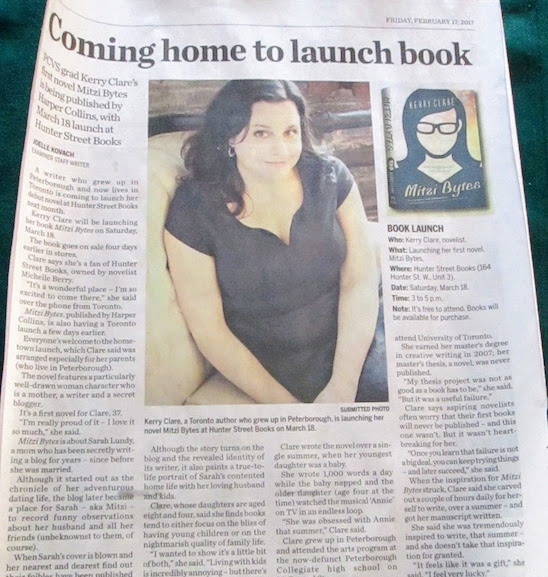
Mitzi Bytes and I were in the Peterborough Examiner the other week with plans for the upcoming launch at Hunter Street Books on March 18. Thanks to Joelle Kovach for a fun interview, a great piece, and for appreciating the novel so well. You can read her article here.
February 22, 2017
More Books on the Radio
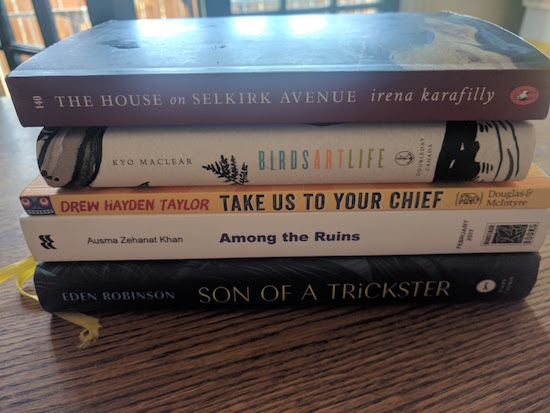
I’m not kidding when I tell you that all I ever really wanted from this life was a books column on the radio, and so my spots on CBC Ontario Morning are indeed the culmination of a dream as well as a great deal of pleasure. What a thing: to get to talk about books you love. Today I talked about this excellent stack of reads, and if you didn’t hear it, you can listen again on the podcast. I come in at 40.40.
February 22, 2017
Where I’m Calling From
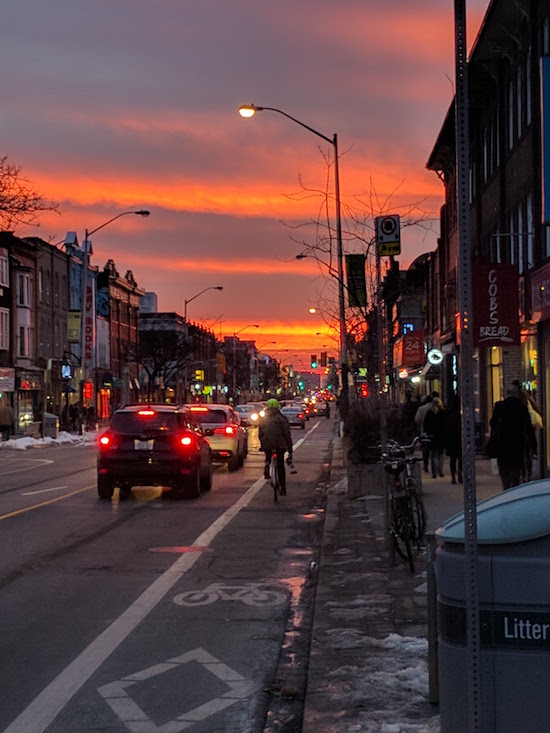
My book exists in the world, it does. I haven’t seen it yet, but it’s being couriered to my house this morning and so at some point in the not-distant future I will be holding it in my hands. Which I’m looking forward to, and not, because I much prefer anticipation to the fleetingness of a single moment. When a carton of The M Word anthologies arrived on my doorstep three years ago, I cried and cried, and not necessarily because of happiness. I remember feeling like kind of a fraud, because I’d published this book, but it wasn’t really my book, and while I was proud of it (and I still am) it felt somehow illegitimate. Would I ever be a real writer? And this, of course, is always the question.
And yet somehow I am a real writer, if the definition of the term is that I have deadlines coming up, just so I don’t have a single moment to take a breath before the book’s release. Which I’m not complaining about. The alternative would be no deadlines, and then I wouldn’t be a writer, and so I go forth, making it up as I go, which is the only way I’ve ever gone. In this way, being a blogger has been a tremendous boon to my writing life. Making it up as we go is our raison d’être.
Thankfully, apart from the flurry (and gift) of work, everything else is quiet—knock wood. We spent a long and low-key weekend partaking in the weird Spring-in-February weather, which I refuse to feel bad about because weather is weather. You take what they give you. The children continue to be funny and interesting, and also very very loud, but we know where they got that from. And the books pile up, and so many of them continue to be exceptional, original—there’s no running out of ideas yet. I love to read. I do so love to read, better than I love almost anything.
“Would you choose me or books,” my family asks me, and I always take the former, but not before hesitating. And not without some reluctance.
How fortunate we are to live in a world where both is not necessarily a spoil of riches.
February 19, 2017
Speedy Deletion: How I Tried and Failed to be on Wikipedia
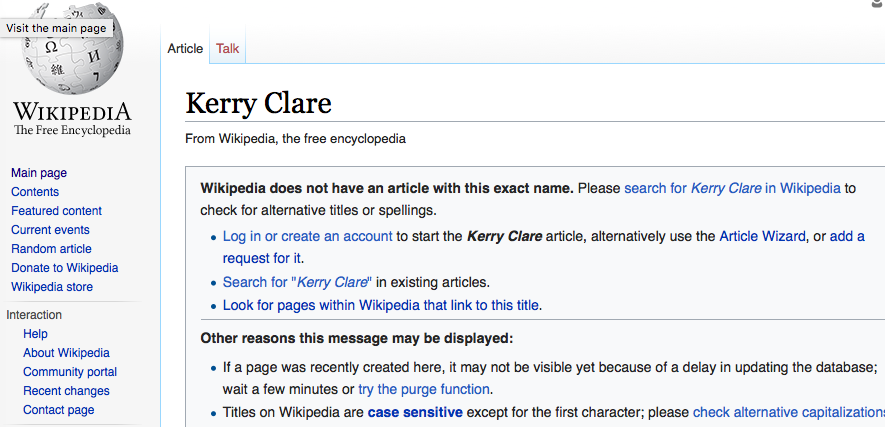
Because I tell you everything, you have to know that I’ve wanted a Wikipedia page since 2008. This was the year my friend got a Wikipedia page. At the time, I barely had a “Published Works” page on my website, and my website was on Blogspot, and I had a long, long way to travel still. And all these details are a little shameful to admit, because we’re all supposed to be cool about this sort of thing. Like, “Oh, do I have a Wikipedia page? I had no idea, because I certainly don’t google myself weekly.” In my next life, I hope to be that cool, but in this life, I’m the woman who finds every mention of me or my work two days before Google Alerts does. Just once I would like Google Alerts to surprise me—for me this would be a definition of success. It would mean not only that my online mentions were turning up in substantial volumes, but also that I have better things to do than hunt about on the internet looking for them.
Anyway, last summer I decided that the time had finally arrived. I’d amassed a small body of work, some prizes, publication credits, and had a debut novel on the horizon. Because it would be cheating to create my own Wikipedia page (although I have been told that this happens all the time) I asked my husband to make mine for me, a really romantic gesture. And he did. It was really nice, and there I was amongst Canadian authors, and Canadian authors born in 1979, even. But it hadn’t even been a day before the Kerry Clare wiki was causing trouble.
The trouble at the start was kind of innocuous. They wanted references and citations, and this was understandable. There was nothing personal about it. I filled in the blanks and added the details. And then the next problem flagged was that my page was not connected to other pages, or referenced by them. Never mind—I’d fix that too. I connected my page to that of authors who’d been published in my anthology; I linked to an author who’d published me in her anthology. If I could I would have literally underlined that I am in fact a National Magazine Award-nominated author, or bolded the text at the very least. And this, the fact of being a National Magazine Award-nominated author, is really a very Canadian thing—you don’t even have to win. But the Wikipedia editors didn’t know this. (Perhaps “this” is also kind of sad. Don’t think I didn’t consider it.)
It was about four days into my career as a person with a Wikipedia page that things got more personal, that the notes on the discussion page began to be written by actual people as opposed to the template messages about links and additional citations. The people, who volunteered their time as Wikipedia editors, were not at all impressed by my accomplishments. And for awhile, I tried to engage with the process, to answer their questions, to fill in the blanks, to vouch for my own notability. But the more I tried, the more adamant the editors became. “Being nominated for an award does not make a person notable,” the editor explained. “She didn’t win the award. And her publication date is so far off into the future that it is likely, especially with the current state of publishing, that her book will never in fact be published.”
At this point I finally gave up. Although saying this suggests I had more agency in the matter than I actually did. Even if I hadn’t given up the fight to be on Wikipedia, I was on the shortlist for speedy deletion and it was probably going to happen anyway. But when I did give up, it was because it had dawned on me that battling to remain on Wikipedia was going to have to become my full-time job, and it was exhausting. Turns out I’m not so unnotable that I had absolutely nothing else to do with my time except battle it out with Wikipedia editors. If I’d devoted my life to staying on Wikipedia, I’d never be able to do anything else that was notable again.
I know some people who are as notable as dirt stuck to the bottom of my shoe, and they’re still on Wikipedia. How, I wonder, have they managed to pull it off? Perhaps it’s such a feat of incredible endurance that it makes a person notable after all?
A few lessons I took away from this: first, that the whole exercise is remarkably gendered. (The dirt on the bottom of the shoe people I refer to are male.) It was not lost on me that I am a woman who does have some accomplishments, and that my work was entirely dismissed without hesitation by a group of men who really knew nothing about those accomplishments, and who did not necessarily have any accomplishments of their own. Perhaps I am wrong about this final point, and I would be ecstatic if I were, in fact, but it does occur to me that profoundly successfully (or notable people) don’t necessarily have the time to be editing Wikipedia in the middle of the night. Anyway, the idea of mediocre men undermining a successful woman was not so mind-blowing—I don’t know where exactly, but I’ve heard that one before…
And the second lesson? That it’s really healthy for a person (especially a person who googles herself on a regular basis) to be reminded of her insignificance. I’m not being facetious. And that Wikipedia notability and other such metrics are not those with which we should necessarily gauge our success in the world. I mean, it would be nice, but these aren’t the things that matter. It’s good to know too one can be a total failure in all these respects, and still be entirely happy, and worthy of existence.
February 14, 2017
Romantic Deal-Breakers
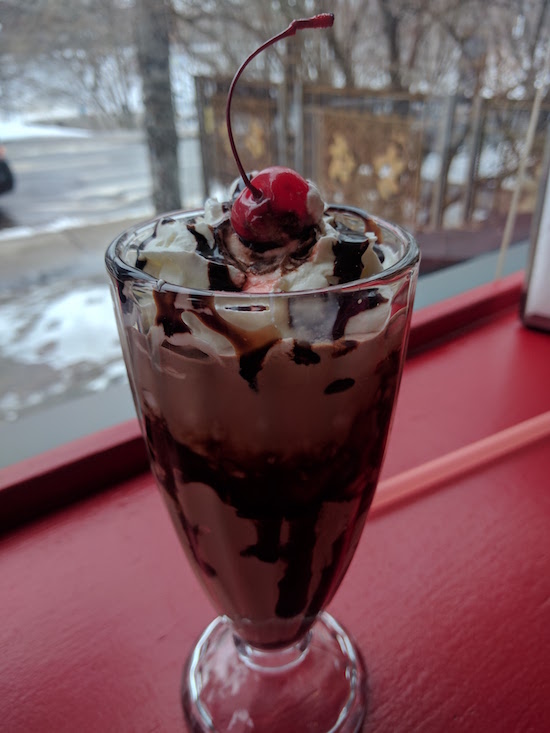
I was happy to take part in a feature at the Globe and Mail in which authors nominate the one book that would be a deal-breaker if you discovered it on a potential partner’s bedside. For me there was no question! Read here to find out the title. And hope you all had sweet Valentines Day, whether it be sweetened with chocolate or cake.
February 13, 2017
Lillian Boxfish Take a Walk, by Kathleen Rooney
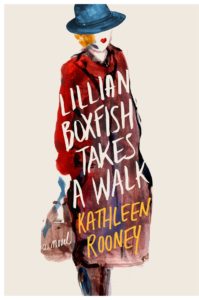 The book everybody’s talking about this season, in my circles at least, is Lillian Boxfish Takes a Walk, by Kathleen Rooney, which I first saw described as Mad Men meets Mrs. Dalloway, or, in other words, as a love letter written directly to my heart. Mad Men because Lillian Boxfish worked in advertising, albeit thirty years before Peggy and Joan, writing copy for R.H. Macy, and she achieved some fame as the highest paid ad woman in America, as well as for her books of Dorothy Parker-esque light verse which sold well in their time. And Mrs. Dalloway because of how the novel is framed in a similar fashion, around a single evening, the last night of 1984 as Lillian Boxfish—old as the century [or actually a year older than that, if you want to get really specific, although she doesn’t]—walks around the New York City she’s seen change around her over the decades. Places on her walk prompting flashbacks to the fascinating story of her career, her marriage, her fame, and various downfalls. In some ways, this is a very easy book, definitely a breezy book, but that to use that point as a dismissal would be to ignore the richness of its language. This is the first book I’ve read in a while which had me pulling the dictionary off the shelf to look up new words, and that makes perfect sense, not just in that Rooney herself is a poet whose attention to language is unsurprising, but so too is her character, Lillian Boxfish (inspired by real-life figure Margaret Fishback). Which reminds me of what Joan Didion wrote about her time working at Vogue where, she writes:
The book everybody’s talking about this season, in my circles at least, is Lillian Boxfish Takes a Walk, by Kathleen Rooney, which I first saw described as Mad Men meets Mrs. Dalloway, or, in other words, as a love letter written directly to my heart. Mad Men because Lillian Boxfish worked in advertising, albeit thirty years before Peggy and Joan, writing copy for R.H. Macy, and she achieved some fame as the highest paid ad woman in America, as well as for her books of Dorothy Parker-esque light verse which sold well in their time. And Mrs. Dalloway because of how the novel is framed in a similar fashion, around a single evening, the last night of 1984 as Lillian Boxfish—old as the century [or actually a year older than that, if you want to get really specific, although she doesn’t]—walks around the New York City she’s seen change around her over the decades. Places on her walk prompting flashbacks to the fascinating story of her career, her marriage, her fame, and various downfalls. In some ways, this is a very easy book, definitely a breezy book, but that to use that point as a dismissal would be to ignore the richness of its language. This is the first book I’ve read in a while which had me pulling the dictionary off the shelf to look up new words, and that makes perfect sense, not just in that Rooney herself is a poet whose attention to language is unsurprising, but so too is her character, Lillian Boxfish (inspired by real-life figure Margaret Fishback). Which reminds me of what Joan Didion wrote about her time working at Vogue where, she writes:
“…I learned a kind of ease with words…a way of regarding words not as mirrors of my own inadequacy but as tools, toys, weapons to be deployed strategically on a page. In a caption of, say, eight lines, each line to run no more or less than twenty-seven characters, not only every word but every letter counted.”
Looking back at her life, Rooney has Lillian Boxfish contemplating the way the public’s relationship to words have changed, the way that the ads she wrote in the 1930s assumed a level of cleverness and awareness of language that contemporary advertising no longer seems to aspire to. Where she finds that same sense of fun and play with language, she remarks, is in the rap music she hears on the streets of New York, a city that’s so much grittier and dangerous than the city she arrived at in her youth. And yet all of it still draws her in, the sounds, the sights, the people all stirring her curiosity. She strikes up conversations and always asks a person’s name, and they get talking, and the moral of every single one of their stories is that people are people, regardless of time or place. Lillian Boxfish sees the humanity, the beauty, in all of it. And so we get to too.
February 9, 2017
Ada Lovelace: Poet of Science, by Diane Stanley and Jessie Hartland
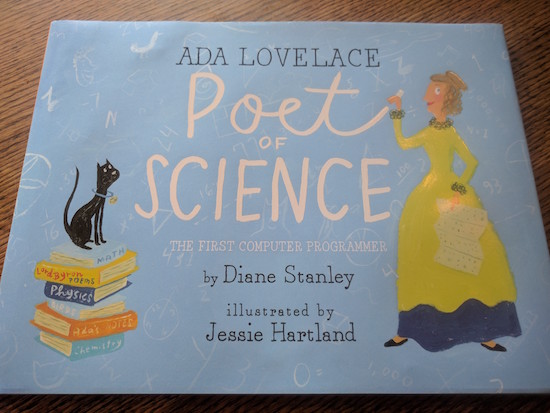
Harriet and I went to see the remarkable Hidden Figures on the weekend, and until the picture book version of the story is released, we will content ourselves with Ada Lovelace, Poet of Science: The First Computer Programmer, by Diane Stanley, illustrated by Jessie Hartland, which was recently selected by the America Library Association among the top ten feminist picture books of last year. (We also know Ada Byron [later Lovelace] as a character from Canadian author Jordan Stratford’s middle-grade series, The Wollstonecraft Detective Agency.)
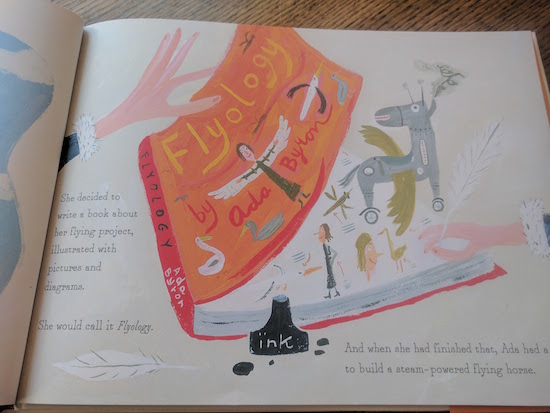
True confession: I don’t understand computer programming. It’s possible that a lifetime of being told that math is hard made me believe that math is hard, or maybe I just find math hard, but my mind doesn’t work that way. I’ve read Ada Lovelace: Poet of Science several times, and while I understand in theory how Ada imagined Charles Babbage’s Analytical Engine worked based on symbols and rules of operation changed into digital form…I actually don’t even understand it in theory. Ada Lovelace’s ideas were inspired by mechanical looms which wove textiles based on patterns dictated by punched cards. I don’t really understand that either.
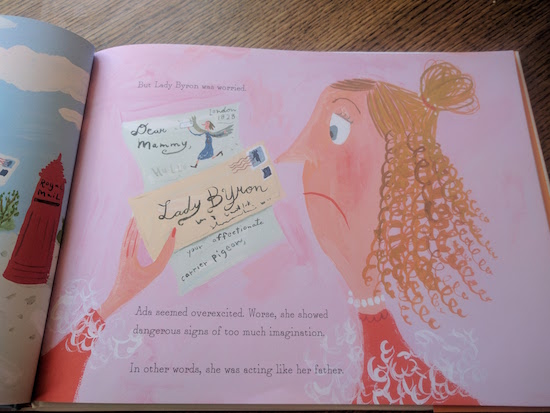
But but but. There is more than one way to be a person, to be a woman, to have a brain. That such things befuddle me is not to say that women are like that and let’s all go back to rocking babies, but instead to say that some women have an aptitude for such things, and it’s useful for even those of us who don’t to realize this. It’s like saying, Maybe I don’t need feminism, but some women do. (Nobody ever says this though. People who don’t need feminism seem to forget the possibility of second clauses.) To be honest, I’m not sure my daughter is going to grow up to be a computer programmer either, genes being what they are, but I will insist on the fact that she knows it’s a possibility. I mean, if a girl could have been one two hundred years ago, before there were even actual computers, then maybe today there are perhaps no limits of what a girl can grow up to be. And isn’t that excellent?
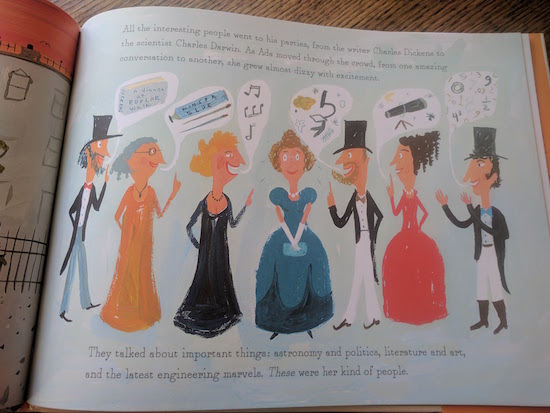
We love this book, about Ada (who gives Rosie Revere, Engineer a run for her money) who has a spectacular imagination, despite her mother’s attempts to school her in logic and rational thinking in order to override her passionate poet father’s genetic legacy. As women of her station had to do, she settled down and married, but that wasn’t the end of her story, and she would go on to do remarkable things in her too short life, indeed becoming the world’s first computer programmer with Babbage’s analytical machine. And what is especially interesting is that there is no direct link between Babbage’s and Lovelace’s work and the development of modern computers, although as Stanley’s author’s note points out, Alan Turing would read their work after they resurfaced after a century of obscurity. But still, I am fascinated by this idea (which is so recurrent in feminism) that some ideas have to be invented over and over again. Or perhaps it’s more miraculous than that—that the great discoveries don’t just happen once, and that progress ain’t a line, but that spectacular bursts of excellence are exploding all the time.
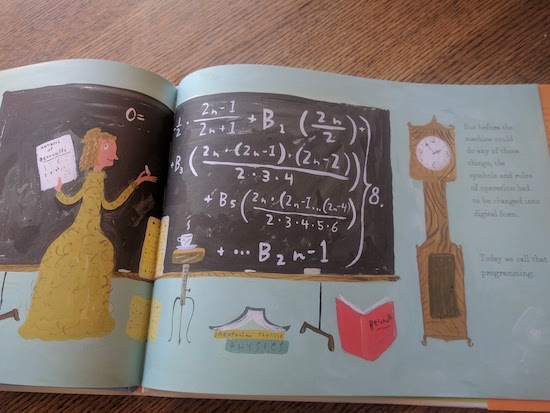
February 7, 2017
The hair has a jacket.
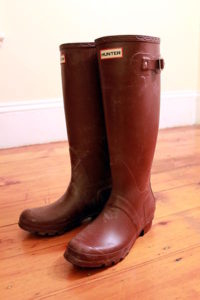 Someone tweeted a photo of Airforce One not long ago, its repulsive occupant on board, and occupant’s jacket was draped around his chair in a most peculiar way, as though the chair was wearing it. “Look! The chair has a jacket!” I tweeted in response, not remotely with wit, except that I actually made a typing error, and my reply in fact read, “Look! The hair has a jacket.” Completely lunacy. And I now have visions these days of running into crowded rooms and screaming this phrase, to everybody’s confusion. Who is that strange person?
Someone tweeted a photo of Airforce One not long ago, its repulsive occupant on board, and occupant’s jacket was draped around his chair in a most peculiar way, as though the chair was wearing it. “Look! The chair has a jacket!” I tweeted in response, not remotely with wit, except that I actually made a typing error, and my reply in fact read, “Look! The hair has a jacket.” Completely lunacy. And I now have visions these days of running into crowded rooms and screaming this phrase, to everybody’s confusion. Who is that strange person?
Somehow between now and my book’s publication, I have to acquire some social skills. I also need to find footwear that isn’t a pair of dirty green rubber boots and a coat that is not in fact a giant duvet with sleeves, if I have any home of creating an impression of the author that isn’t “vagrant.” Vagrant who has forgotten how to smalltalk and keeps pointing out how the hair has a jacket.





